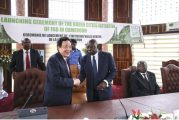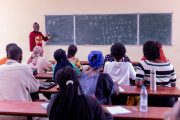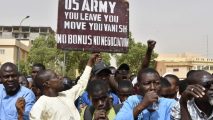Categories
Recent Posts
- Understanding the Biya Francophone regime’s support for the Israeli genocide in Gaza
- US: Prosecution lays out ‘criminal conspiracy’ as Trump’s hush money trial opens
- FAO formally launches Green Cities Initiative in Cameroon
- Football: Barcelona wants Clasico replay if Yamal ‘ghost goal’ call wrong
- Poverty under Biya: Cameroonians embrace Chinese language for brighter futures
Archives
- April 2024
- March 2024
- February 2024
- January 2024
- December 2023
- November 2023
- October 2023
- September 2023
- August 2023
- July 2023
- June 2023
- May 2023
- April 2023
- March 2023
- February 2023
- January 2023
- December 2022
- November 2022
- October 2022
- September 2022
- August 2022
- July 2022
- June 2022
- May 2022
- April 2022
- March 2022
- February 2022
- January 2022
- December 2021
- November 2021
- October 2021
- September 2021
- August 2021
- July 2021
- June 2021
- May 2021
- April 2021
- March 2021
- February 2021
- January 2021
- December 2020
- November 2020
- October 2020
- September 2020
- August 2020
- July 2020
- June 2020
- May 2020
- April 2020
- March 2020
- February 2020
- January 2020
- December 2019
- November 2019
- October 2019
- September 2019
- August 2019
- July 2019
- June 2019
- May 2019
- April 2019
- March 2019
- February 2019
- January 2019
- December 2018
- November 2018
- October 2018
- September 2018
- August 2018
- July 2018
- June 2018
- May 2018
- April 2018
- March 2018
- February 2018
- January 2018
- December 2017
- November 2017
- October 2017
- September 2017
- August 2017
- July 2017
- June 2017
- May 2017
- April 2017
- March 2017
- February 2017
- January 2017
- December 2016
- November 2016
- October 2016
- September 2016
- August 2016
- July 2016
- June 2016
Featured
 Understanding the Biya Francophone regime’s support for the Israeli genocide in Gaza
Understanding the Biya Francophone regime’s support for the Israeli genocide in Gaza  Poverty under Biya: Cameroonians embrace Chinese language for brighter futures
Poverty under Biya: Cameroonians embrace Chinese language for brighter futures  Cameroon is broken: Who can fix it?
Cameroon is broken: Who can fix it?  Ethiopia: U.S Senator Cardin Statement on the Killing of Bate Urgessa
Ethiopia: U.S Senator Cardin Statement on the Killing of Bate Urgessa  Battle for the Unity Palace: ANNOUNCEMENT!
Battle for the Unity Palace: ANNOUNCEMENT!
Most Commented Posts
 4 Anglophone detainees killed in Yaounde
4 Anglophone detainees killed in Yaounde
19 comments Chantal Biya says she will return to Cameroon if General Ivo Yenwo, Martin Belinga Eboutou and Ferdinand Ngoh Ngoh are sacked
Chantal Biya says she will return to Cameroon if General Ivo Yenwo, Martin Belinga Eboutou and Ferdinand Ngoh Ngoh are sacked
13 comments Anglophone Nationalism: Barrister Eyambe says “hidden plans are at work”
Anglophone Nationalism: Barrister Eyambe says “hidden plans are at work”
12 comments The Anglophone Problem – When Facts don’t Lie
The Anglophone Problem – When Facts don’t Lie
12 comments Largest wave of arrest by BIR in Bamenda
Largest wave of arrest by BIR in Bamenda
10 comments
Latest Tweets
Featured
-

Understanding the Biya Francophone regime’s support for the Israeli genocide in Gaza
-

US: Prosecution lays out ‘criminal conspiracy’ as Trump’s hush money trial opens
-

FAO formally launches Green Cities Initiative in Cameroon
-

Football: Barcelona wants Clasico replay if Yamal ‘ghost goal’ call wrong
-

Poverty under Biya: Cameroonians embrace Chinese language for brighter futures
-

US agrees to withdraw troops from key drone base in Niger
-

CPDM Crime Syndicate repays CFA39.8bn debt with new borrowings
© Cameroon Concord News 2024
15, January 2020
African Bar Association weighs in on the Ambazonia Crisis 0
The President of the African Bar Association, AFBA, Hannibal Uwaifo, has, in a correspondence to the Prime Minister of Great Britain, Boris Johnson, suggested that an imposed solution to the Anglophone Crisis in Cameroon, either through conquest or from a third party, will only mean more wars.
The AFBA President, thus, suggested a United Nations organised and supervised referendum for Southern Cameroonians to decide their fate. In the letter dated January 10, Hannibal Uwaifo bemoaned that the indifference of the international community and silence of major powers, has encouraged untold suffering and human rights violations to go on unabated in the North West and South West Regions of Cameroon.
“Trenches have been dug and the Government of Cameroun has been encouraged to kill and imprison more as the United Nations, the Commonwealth of Nations and great countries like Great Britain, which handed the Southern Cameroon to Francophone Cameroun, have refused to speak decisively and hold the Cameroun Government accountable for crimes committed against defenceless citizens of Southern Cameroon,” the letter stated.
Asserting that there is no end in sight to the violence in the affected Regions, the African Bar President outlined that the Swiss-led dialogue process, encouraged by the international community, has, so far, been embraced only, by the “so-called Separatists.”
He went further to remark that the Cameroun Government has, so far, not made known its stance on the Swiss-led mediation process. In his correspondence to the British Prime Minister, AFBA’s Hannibal Uwaifo also detailed the historical background of the conflict. He cited various highpoints in the history of the two Cameroons, the decolonisation process, the referendums, the terms of the proposed union between the two States and other relevant high points.
On the way forward, the African Bar President, speaking on behalf of the Executive Councils of the African Bar Association, proposed a referendum for Southern Cameroonians to decide their fate. He wrote: “Given all these considerations, the African Bar Association is of the strong opinion that, rather than third party suggesting solutions for a problem which they are not suffering, the best and most transparent and democratic solution would be a UN-organised referendum in the British Southern Cameroons, for its people to pronounce themselves on whether they wish to continue to live under Cameroon; to form some kind of association with Cameroon, documented by treaty, or to govern themselves within their own internationally defined territory.
Citing practical examples, AFBA’s President further stated: “Scotland, Quebec, New Caledonia, Bougainville, the UK itself within the European Union, South Sudan and many other countries, have resorted to referenda to settle such supreme matters of interest to their people. There is no reason to deny the people of Southern Cameroons a similar opportunity for this supreme matter. We firmly believe that the people should be given a chance to speak for themselves. This will automatically lead to a ceasefire. The conditions for such a referendum can be worked out to ensure transparency and fairness.”
On the second option, Hannibal Uwaifo, on behalf of African lawyers, suggested that, if any of the parties to the conflict is uncomfortable with the referendum option, the second best option will be for the matter to be settled at the International Court of Justice, ICJ. Here, he said, the ICJ will decide on; “… whether the territory of the Southern Cameroons belongs to the Republic of Cameroon or the people of the British Southern Cameroons.”
Source: Cameroon Info.Net